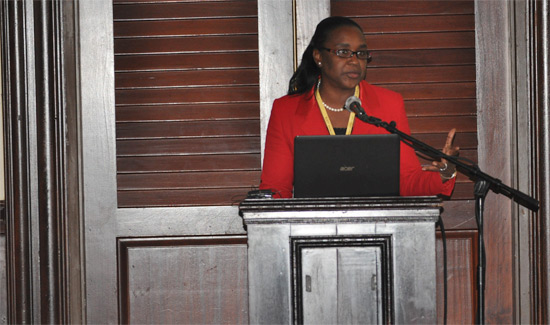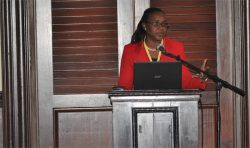
A leading compliance expert is stressing the need for intensive lobbying and dialogue between regional correspondent banks and U.S-based Tier 2 banks amidst the current climate of de-risking.
Cheryl Bazard made the call at a recent anti-money laundering conference in Antigua and Barbuda.
“Compliance professionals within the region must get together from a private sector perspective to have meetings with international Tier 2 banks to seek alternative relationships,” said the attorney and founding president of the Bahamas Association of Compliance Officers (BACO) – the organization tasked with ensuring the integrity of the financial services sector.
Correspondent banking services make it possible for businesses and individuals to transact internationally and make cross-border payments.
The term “de-risking” refers to financial institutions ending relationships with those perceived to be “high risk” for raising, moving or storing funds which are somehow tainted.
According to the World Bank’s findings published in a November 2015 report, large international banks have begun to terminate or “severely” limit their correspondent banking relationships with smaller banks in jurisdictions around the world.
The Caribbean has been the region most severely impacted, the report noted.
At the 8th Annual AML/CFT, Anti-Fraud and Financial Crimes Conference hosted by KAW Management Services Ltd., Mrs Bazard addressed the retraction of Correspondent Banking Relationships (CBRs) by banks out of the U.S., Canada and the U.K. affecting the financial services sector both locally and regionally.
The conference ran from July 11 -13, at Sandals Grande Antigua Resort and Spa in Dickenson Bay, St. John’s.
The former senator’s presentation highlighted alarming statistics drawn from the International Monetary Fund (IMF) Staff Discussion Note on “The Withdrawal of Correspondent Banking Relationships: A Case for Policy Action,” issued in June 2016.
The report found 16 banks in five Caribbean countries have lost all or some of their CBRs since May 2016. It also noted that CBRs that brought less than $50,000 per annum were unilaterally discontinued.
Researchers have identified the services most affected by the withdrawal of correspondent banking as cheque clearing and settlement, cash management services, international wire transfers and, for banking authorities and local/regional banks, trade finance.
The report also questioned the real reasons for dwindling relationships given that there has been no malfeasance of banks and financial institutions in the region.
“It is a fallacy that The Bahamas and the Caribbean are being viewed as jurisdictions with weak and inadequate AML/CFT (anti-money laundering/countering the financing of terrorism) rules and standards and a culture of lax due diligence,” said Mrs Bazard.
“At the end of the discussions, it was agreed that moving forward, practitioners will lobby outside of governmental efforts across the region and in the United States and put forward our arguments and positions, which sometimes, players in the United States are unaware of.”
Following the conference, Mrs Bazard was invited to appear on the Observer radio station 91.1FM’s “Good Morning Antigua and Barbuda” show where, for almost an hour, she answered callers’ questions regarding compliance in the financial services sector.
Tosheena Robinson-Blair
Precision Media
Leading compliance officer, attorney Cheryl Bazard was a presenter at the 8th Annual AML/CFT, Anti-Fraud and Financial Crimes Conference hosted by Antigua and Barbuda’s KAW Management Services Ltd.




